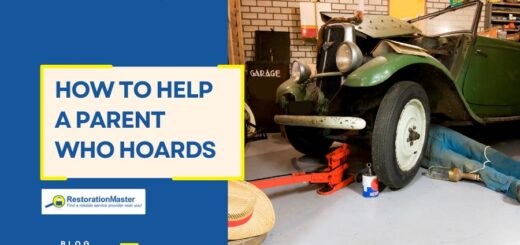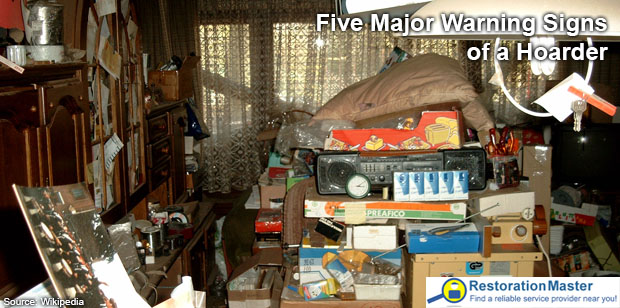Hoarding, cluttering or collecting – where does the thin line lie?
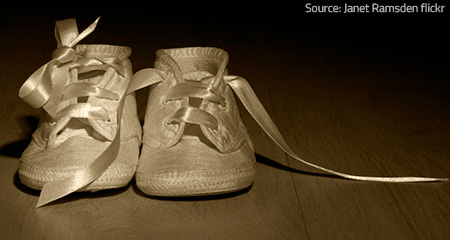
Precious memories never wear out.
How often do you look at one of your personal items and feel attached to it? Material possessions may have value far beyond their market price. Maybe this pair of cheap earrings was a present from a childhood friend? Or this faded rug was woven by your great-grandmother? Or your young son made his first steps in these small worn out shoes? Precious memories are often associated with low-cost items and their value automatically becomes priceless.
On the contrary – many outdated objects have no sentimental value at all, but you still find it difficult to discard them. It may be because you think you will need them later, or it may be because you had hard time obtaining them. If you had to save money from every paycheck for five years or so to afford your first computer, you will probably think twice before letting it go, although it is almost useless now and you have already purchased a brand-new laptop. When you invest time and efforts in something, it gains value high above its market cost.
Piling all those valuable items in your home, however, is not a great option. You restrict your living space and disorganization turns your home into total mess. All the more, you will probably even forget what specific items you stored in your cluttered home. Then creating a hoard is just one step away.
While being resourceful and recycling used items is great indeed, you should not mix the concepts. Hoarders’ actions have just the opposite effect. They try to make sure that no item is wasted but they actually render every possession of theirs beyond repairRepair is the act of fixing or restoring damaged property, m... More and further use. Because of their severe problem with decision-making, hoarders can’t properly categorize things according to their importance and feel tortured by the fear of losing something valuable during the hoarding cleanup process.
Hoarding Issues Are Both Sad And Dangerous
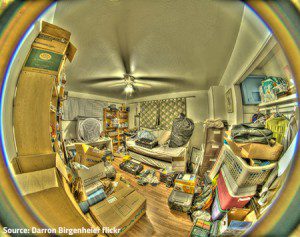
Hoarders compensate for what they have lost by accumulating junk.
Typical hoarding is attributed to obsessive compulsive disorder. It is characterized by excessive acquisition of valueless items and severe indecisiveness that prevents the hoarder from throwing any of them away. As a result, sanitary problems often occur because of the accumulated dust, possible moldMold is a type of fungus that grows in damp or humid conditi... More or bacteria growth, insect infestation and so on. Most of the accumulated stuff is flammable, so the risk of a fire increases significantly as well. And worst of all – hoarders inevitably become isolated and socially withdrawn. Without a doubt, the situation is very dangerous and sensitive, so hoarding cleanup must be performed in a delicate way with consideration and patience.
Hoarding is usually triggered by a very stressful or traumatic experience and more often than not, the person involved may have suffered a bitter loss. Only empathic and confidential approach may succeed in convincing hoarders to rearrange their possessions and to understand that they live in poor sanitary conditions. Hopefully, they will realize that certain items mean nothing to them and will agree to discard some of the accumulated stuff. They should be talked into getting rid of all useless material possessions but saving items of emotional value will help hoarders cope with the cleanup process. Then, hire a professional hoarding cleaning service provider to decontaminate and deodorize their homes and help restore a normal lifestyle. However, anxiety and disorganization will remain an issue.
Disorganization Is A Common Flaw That Results In Cluttering
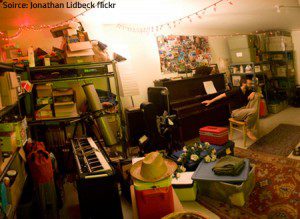
Home full of valuable items and memories, or the first signs of a hoard?
Disorganization is the direct consequence of having limited space to store a great number of possessions and no spare time to decide which of them are really worth keeping. Then cluttering becomes inevitable. It results from the desire to preserve things which are not severely damaged and could be eventually used again someday, or because they remind us of someone or something. About ten percent of Americans have rented a storage unit to evade the problem while the rest just clutter their garages and attics, rendering them useless. But time slowly ruins the accumulated items and they eventually sink into oblivion while the clutter keeps getting bigger and messier and hoarding becomes a tangible threat.
However, hoarder cleanup is not required in such cases because clutter does not present immediate danger. Actually all the clutter around us is a collection of memories of sort.
Collecting Items Does Not Lead To Cluttering Or Hoarding
A collection also results in accumulated objects but is essentially different both in purpose and effect. Collected items are well organized and sometimes very valuable. Rare collections of antique items are worth plenty of money and can have historic or cultural significance. But even simple collections of beautiful strangely-shaped bottles or tons of comic books, for example, are always tidy and systematic. They are intended to bring pleasure and satisfaction. Collections reflect the aesthetic tastes of their owners and reveal their interests. People usually want to display the things they have collected over time, for they constitute a source of pride.
Hoarders, on the other hand, feel ashamed and prefer to hide their cluttered homes. They invite no one to visit because they are afraid of being forced to clean up and lose hold of valuable possessions.
So, The Line Is Getting Even Thinner
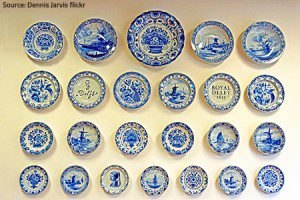
Which one do you like the best?
What marks the distinction between the above-described social phenomena is hard to recognize but it makes a heck of a difference! For example, a young girl may be interested in collecting fashion magazines from around the world. She will have them nicely arranged on shelves and will take pleasure in turning the pages and dreaming. A woman who is working in the fashion industry, on the other hand, may have her home cluttered with various model sketches, cloth samples and various designer materials. She will probably complain about not having enough space and will be overwhelmed by the mess she has mindlessly created. The owner of a small tailoring studio that has gone bankrupt, however, may become a typical hoarder. Angry and disappointed, she may pile all the already useless materials from the studio in her home and refuse to throw anything away or clean. The hoard will slowly grow in size and so will the psychological impact on the hoarder.
Obviously, collecting brings joy and pride, cluttering causes problems and disorganization, while hoarding results in total chaos and dead-lock. A collection is smaller in size and consists of precious items, a clutter is a large mess of potentially useful stuff and a hoard is an unsanitary accumulation of valueless objects which can only be discarded by proper hoarder cleaning.
You should remember that regardless of the value assigned to a specific object, it remains just a commodity and nothing more. The memories are well hidden deep inside you and even the loss of their associated items cannot make them fade away. All our material possessions are meant to serve us, not the other way around. And hoarders become slaves to their items.
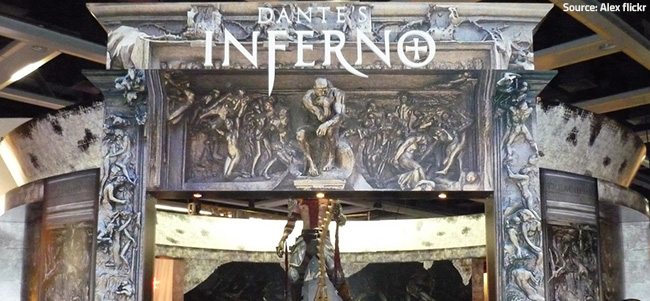
Watch your steps – they might be leading you in the wrong direction.
This delusion creates a great threat to their health and severely restricts their social interactions. The low hygiene and the peculiar attitude of these people repel the others and prevent hoarders from having a normal lifestyle. The unique problem they have with decision-making is actually ruining their future and turns their daily experience into hell. The consequences are so horrible that Dante reserved the fourth circle of Hell in his famous book Inferno for hoarders and their eternal painful struggle with the opposing wasters.
So, if you want to help a friend or a relative who shows signs of compulsive hoarding disorder from this agony, arrange for professional hoarder cleaning and appropriate psychiatric therapy. This will help them to overcome their anxiety, to restore their sanity and to accept the real world.











